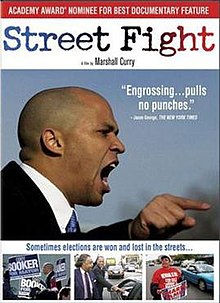Street Fight (film)
| Street Fight | |
|---|---|

Promotional poster for Street Fight
|
|
| Directed by | Marshall Curry |
| Produced by | Marshall Curry |
| Written by | Marshall Curry |
| Starring | Cory Booker, Sharpe James, Al Sharpton |
| Distributed by | Marshall Curry Productions |
|
Release date
|
|
|
Running time
|
83 minutes |
| Country | United States |
| Language | English |
Street Fight is a 2005 documentary film by Marshall Curry, chronicling Cory Booker's 2002 campaign against Sharpe James for Mayor of Newark, New Jersey. Other credits include Rory Kennedy (executive producer), Liz Garbus (executive producer), Mary Manhardt (additional editor), Marisa Karplus (associate producer), and Adam Etline (story consultant). Street Fight screened at the 2005 Tribeca Film Festival and was later aired on the PBS series P.O.V. on July 5, 2005, and CBC Newsworld in Canada on May 7, 2006.
The film was nominated for an Academy Award for Best Documentary Feature.
The film details the hard-fought mayoral campaign by a young community activist and City Council member (Booker) against a 16-year incumbent mayor (James) with a powerful political machine. The documentary follows Booker and several of his campaign workers from their early days of door-knocking on Newark streets through the campaign's dramatic conclusion.
Through the course of the film, Booker's living conditions, race, ethnicity, religion, sexuality, political affiliations, and position in Newark are questioned. From 1998 to 2006, Booker lived in Brick Towers, one of the city's worst public housing buildings, which some accused to be a tactic for acceptance by his constituents. As the election campaigns escalate, Booker receives endorsements from Spike Lee, Cornel West, and other prominent African American figures.
The movie brings to light many issues plaguing minority communities in Newark and reveals how the city government has failed to acknowledge these issues. The film also raises questions of race and what it means to be "black," as Sharpe James questions Booker's African American heritage and roots to his community.
...
Wikipedia
